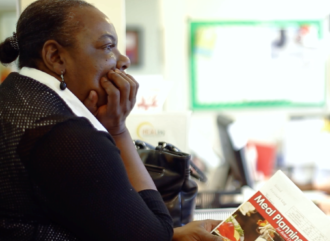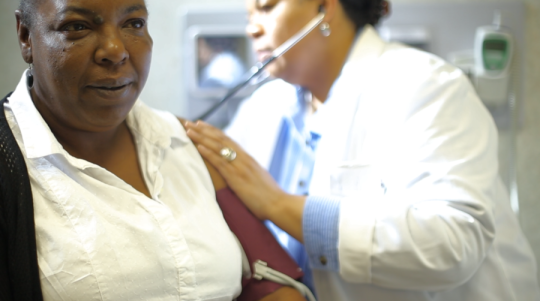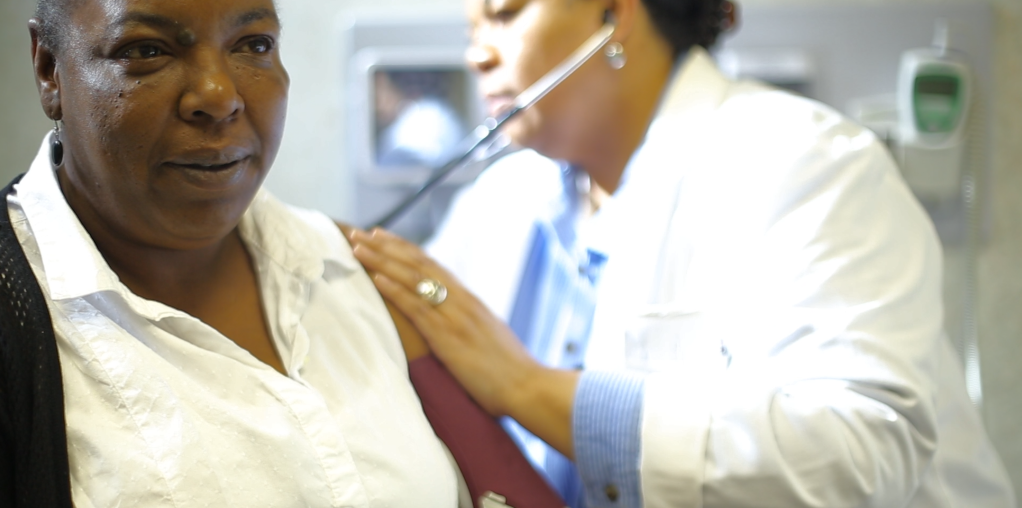Kay Rogers had been a bus driver in Georgia for several years when she had a heart attack in 2012.
[vimeo]https://vimeo.com/185535964/ae8b1552a5[/vimeo]She was suffering from congestive heart failure, a chronic illness that meant eventually she couldn’t keep working the same number of hours. She was terminated from her job.
Unemployed, uninsured and weakened by a chronic illness, Rogers applied for disability benefits. She was denied. She appealed that decision, but was denied again. Now her illness has progressed so far that she is unable to work a full-time job.
To compound her problems, Rogers, 52, finds herself in what is known as Georgia’s “coverage gap,” That means she doesn’t qualify for Medicaid under the state’s current eligibility rules, and she doesn’t make enough money to get discounted coverage through the health insurance exchange. So she’s left uninsured.
Hundreds of thousands of other low-income Georgia adults are in the same predicament.

This gap came about through a combination of circumstances. The 2010 Affordable Care Act (also known as the ACA or Obamacare) overhauled the U.S. health system, adding the insurance exchanges and other new features and expanding the Medicaid rolls by making more people eligible. But Medicaid is a federal-state program, and the U.S. Supreme Court ruled in 2012 that individual states didn’t have to accept expansion.
As of now, 19 states have rejected Medicaid expansion, and Georgia is one of them. Here, people like Rogers are not eligible for Medicaid, though it was the intent of the ACA that they would be covered by it.
Gov. Nathan Deal and legislative leaders have opposed Medicaid expansion from the start, saying it would eventually hurt the state’s budget, and the General Assembly’s Republican leadership has never taken up the proposal. That began to change somewhat this year, with GOP lawmakers under the Gold Dome showing interest in some form of expansion, aided by a Georgia Chamber of Commerce task force that has endorsed increasing coverage for low-income people.
A wild card in the debate
Of course, recent election results dramatically changed the equation on health care policy, even in the 31 states where Medicaid has already been implemented.

On Nov. 8, Donald Trump won the presidency while his fellow Republicans kept full control of Congress. That means the GOP’s longtime goal of scrapping the ACA is suddenly a real possibility, though not a certainty.
“Repeal and replace” is the standard phrase for Republican opponents of Obamacare, but some have mentioned “amending” it, and the president-elect has said he supports keeping a few popular parts of the law.
What all this will mean for Medicaid — in Georgia or nationwide — is impossible to say. Still, some GOP governors and some members of the powerful Senate Finance Committee have expressed interest in preserving expanded Medicaid coverage.
An overburdened system
States’ decisions not to expand Medicaid have had a major impact on the size of America’s population without health coverage — more than half of the nation’s 29 million uninsured people live in states that have not expanded Medicaid. Georgia had the third highest number of uninsured last year.
“[Medicaid is] designed to really address the health care access of people who are really poor and very needy,” says Eric Wright, a public health and sociology professor at Georgia State University. “I think the idea, at least originally under the ACA, is by providing more poor people with access to Medicaid, they could then perhaps reduce the utilization of emergency rooms and community health clinics — give them a little more choice, a little more access to health care, and might actually ultimately help them get out of poverty.”

Grady Memorial Hospital is Atlanta’s overstretched safety-net hospital, serving thousands of people who have no insurance.
“We certainly saw a number of people that would have benefited from health insurance,” says Charlene Turner, former director of social services at Grady, where she worked for decades before retiring recently.
Turner says she was looking forward to the enactment of the ACA, thinking that it would provide insurance for the many poor and uninsured people the hospital served. “Well, that didn’t happen,” she says.
“If you have no job, you get turned down automatically,” says Turner. “That leaves out a fairly large number of people who have these chronic illnesses that keep them from going to work on a regular basis, so they end up being unemployed and then have no health insurance.”
The kindness of strangers
Kay Rogers relies on nonprofit clinics for regular primary care and treatment.
Unable to work, Rogers has only one source of income: the food stamp assistance she receives from the state. She has exhausted the savings she accrued from her long career, and she lost her home in 2014.
She stays in a friend’s spare bedroom in Atlanta, with her boxed-up belongings around the bed.

Now Rogers relies on the chance of generosity at facilities such as Piedmont Atlanta Hospital to receive high-quality care fast, when her life depends on it.
Last year, at a routine appointment, a clinic physician gave her some stark news. He told her that her heart was in such poor condition that, if it was left untreated, she soon would have a stroke and die.
The doctor’s connections at Piedmont allowed him to arrange for her admission to an intensive care unit, where a team of doctors was able to monitor her condition. When part of her heart stopped working that Saturday, the team conducted a procedure to get it going again, saving her life.
The treatment would have cost $30,000 if the hospital had not decided to waive the charges. (Still, Rogers says she regularly receives calls from collection agencies.)
But her congestive heart failure persists, and Rogers works diligently to maintain a diet and lifestyle that keeps her heart functioning.
She’s terrified that more palpitations will come, knowing that if they do, she will be dependent on the mercy of physicians, hoping they will step in once again to provide the lifesaving care she cannot afford.
Right now, the medications she has to take multiple times a day make her very drowsy, and she’s unable to operate a vehicle or machinery, she says.
Rogers says it’s difficult for her to believe that for her and others like her, there’s no system in place to care for them after they’ve been longtime taxpayers.
“You give so much when you’re working, but then if . . . something goes wrong, and you have nothing to give anymore, it’s like nobody cares,” she says.
“I just find it hard to believe that you would allow people to actually die rather than to allow them to have Medicaid.”
Jenny Catherall and Camille Pendley, both Atlanta natives, are committed to telling pressing and underreported stories in a responsible and inclusive way. Jenny, a filmmaker based in New York, documents untold stories about marginalization, discrimination, and human rights abuse as a freelance shooter and editor. Camille is a freelance journalist based in Atlanta and focuses on social and criminal justice issues.

